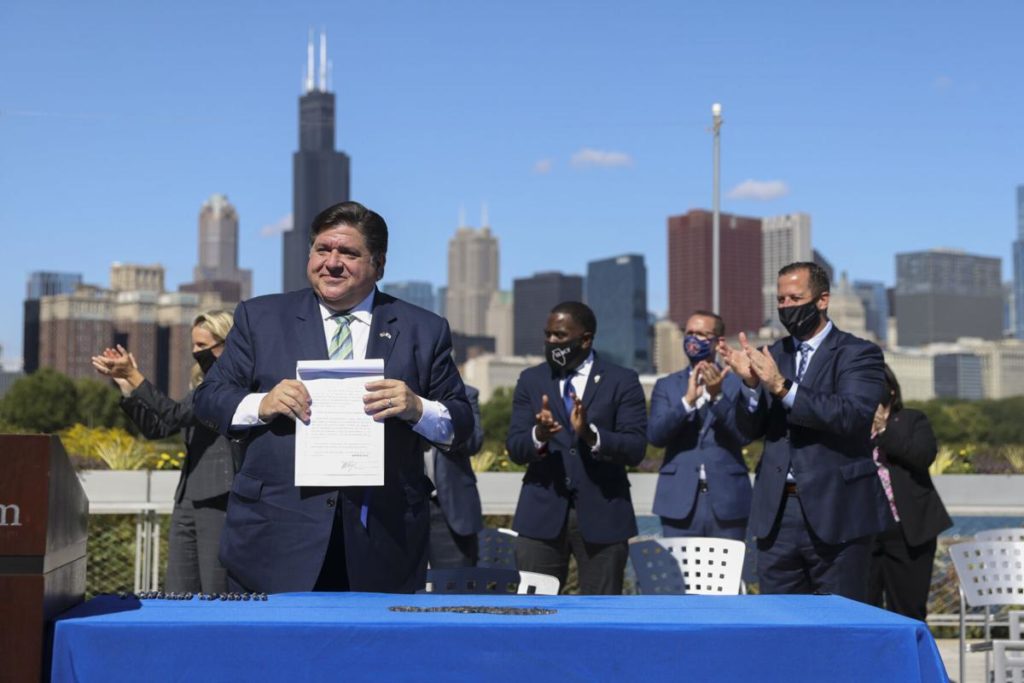
SPRINGFIELD, Ill. (AP) — Illinois Gov. J.B. Pritzker on Wednesday signed into law a pledge to eliminate the state’s climate-damaging carbon emissions within a quarter-century, including money to keep clean-power nuclear plants running while shuttering coal-fired plants.
The legislation invests in the development of renewable solar and wind energy. It also provides incentives for individual action, such as a rebate of up to $4,000 for the purchase of electric vehicles. Pritzker wants 1 million electric cars on roads by 2030.
“We can’t outrun or hide from climate change,” Pritzker said Wednesday, offering examples of its recent devastating impact on Illinois: a polar vortex, floods, record-high heat and lake levels.
The first-term Democrat added: “There is no time to lose. But what we can do is to fight to stop and even reverse the damage that’s been done to our climate. As of today, Illinois is a force for good, for an environmental future we can be proud of.”
To reach its goal of a carbon-free Illinois by 2045, the law props up two nuclear power plants — the Byron power station and the Dresden plant in Morris — that owner Exelon declared unprofitable in announcing last month that they would close without legislative intervention. A $700 million ratepayer-financed subsidy to Exelon saves thousands of jobs associated with the plants and the large amount of clean power they provide, which boosts the state’s race with the climate from the start.
Power plants that churn out electricity by burning fossil fuels will by 2035 have to cut emissions by 45% and permanently close by 2045. The largest impact will be on municipally owned utilities in the capital city of Springfield and in Marissa, 41 miles southeast of St. Louis.
Lawmakers said utility rates will increase under the plan, costing ratepayers about $3.50 more per month, although one interest group calculated a cost as high as $15.
While action around the edges on clean air has continued for decades, Pritzker made the idea a campaign promise and, upon taking office in 2019, found himself among other newly elected Democratic officeholders who embraced the idea. Negotiations over green goals, saving jobs and handling the state’s six nuclear power plants, which produce half of Illinois’ energy, delayed progress.
Nakhia Crossley, regional director and counsel for the Solar Energy Industries Association, estimated that investment in renewable energy projects will produce 50,000 jobs statewide within the next decade.
During legislative debate, critics derided the coal-plant strictures. Springfield taxpayers have upgraded City Water, Light & Power to clean up its emissions. And the 2012 opening of Marissa’s Prairie State Generating Co., under existing clean-air laws, reveals the economic and ideological struggle over the severity of the threat of climate change and how best to halt it.
Additionally, the plants’ proponents say no amount of wind or solar power will replace the lost production. They argue the state will have to import electricity from other states — likely fossil-fuel electricity.
Others take issue with what they term a “bailout” for Exelon despite an ongoing federal investigation involving its subsidiary, ComEd. ComEd acknowledged to federal prosecutors last year that it had engaged in a decadelong bribery scheme in Springfield that has implicated and led to the ouster of former House Speaker Michael Madigan and produced indictments of Madigan’s closest confidante and a former ComEd CEO, among others.
But the law provides oversight for ComEd and counterparts such as Ameren Illinois. It creates an ethics officer at the Illinois Commerce Commission to monitor them and it severely limits previous rate-setting ability.
Sen. Michael Hastings, a Tinley Park Democrat who was a sponsor of the plan, said: “Those folks who cast a dark cloud over our great state of Illinois, this bill will hold you accountable.”
By JOHN O’CONNOR for the Associated Press
